home | internet service | web design | business directory | bulletin board | advertise | events calendar | contact | weather | cams

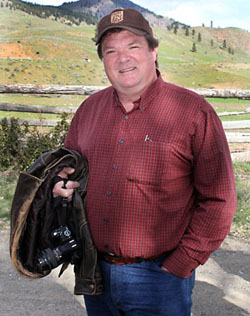 Curtis Beus, who teaches the Sustainable Small Farming course, took his students on a field trip to help them better understand the realities of commercial farming. Curtis Beus, who teaches the Sustainable Small Farming course, took his students on a field trip to help them better understand the realities of commercial farming.Reality Check PART ONE OF A SERIES Every year Curtis Beus, the Okanogan County director of Washington State University Extension, teaches a Sustainable Small Farming course for new farmers. For almost two decades he’s listened to students’ dreams, taken them on tours of existing farms and walked the land of everyone who’s invited him to make a site visit. This year the 10-week class was taught in the Methow Valley at TwispWorks and drew a diverse group that ranged from urban transplants who’d never planted a garden to experienced farmers wanting to learn how to better market their products. Now that those students have had a chance to tweak their dreams and put what they learned to use, Grist will share some of their stories over the next few weeks. Beus said he starts the course by telling the story of a young woman he met in Clallam County, where he was the extension agent for 17 years. On the first day of class she told him she and her newlywed husband were about to close on the purchase of 10 acres of land. “You need to make sure your partner is on board financially, emotionally and physically” before you sign, Beus advised her. 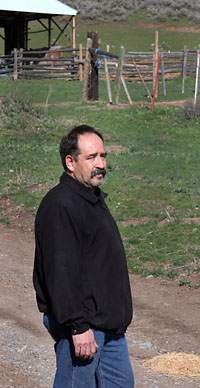 Golden Doe manager Jesse Lopez oversees the ranch, including sheep and cattle production, for the owner, who lives west of the Cascades. Golden Doe manager Jesse Lopez oversees the ranch, including sheep and cattle production, for the owner, who lives west of the Cascades.The woman went home and had a heart-to-heart talk with her new husband, who was grateful for the conversation. It turned out he did not share her farm dream but was going along with buying the land because he wanted her to be happy. He told her he couldn’t imagine what his role would be on a small farm. Beus said, “She dropped the course in tears.” Beus said he shares the story because he considers it a success: The young couple learned they were not on the same page before making an investment. By mid-April this year’s crop of 32 students had heard speakers talk about subjects such as planning a farm, soil and weed management, water, and raising vegetables, poultry and livestock. They also had acquired a three-ring binder overflowing with additional resources. And on a sunny spring morning, they went on a field trip to take an up-close look at three small commercial farms that raise livestock and sell farm products. It was a beautiful day full of sobering realities about farm life. The Golden Doe Ranch The first stop was the 500-acre Golden Doe Ranch off the Twisp-Carlton road, which nestles against the foothills of the Sawtooth divide. There, fellow classmate and ranch manager Jesse Lopez was tending about 100 calving cows, a noisy pen full of hungry newborn lambs and a litter of border collie pups that were ready for new homes. Lopez said he had accumulated years of ranch work experience and did not feel overwhelmed by the demands of his responsibilities for the absentee owner of the Golden Doe. The pups proved irresistible and at least three had new owners by day’s end, including two that went to Travis Johnson’s place about eight miles up-valley from Pateros above the town of Methow. Johnson moved to the valley from Illinois in 2002 and met his future wife, Rebecca. By the time the class ended, the couple realized the land they were buying was not suitable for a dry land farm. Travis, an experienced electrician who is determined “to retire a farmer,” said he and Rebecca will look for land with water and already-developed infrastructure. “And we may need to get experience managing someone else’s farm,” he said, perhaps through internships and folk-school vacations. He added that the class taught him that “We don’t have a plan. We have a lot of dreams.” 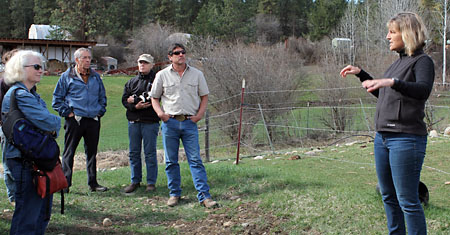 Jennifer Argraves, who operates Crown S Ranch south of Winthrop with her husband, Louis Sukavoty, tells the touring students what it takes to run a commercial organic farm. Jennifer Argraves, who operates Crown S Ranch south of Winthrop with her husband, Louis Sukavoty, tells the touring students what it takes to run a commercial organic farm.Crown S Ranch The next stop was the Crown S Ranch just south of Winthrop across from Methow Valley Elementary School. The ranch is owned by Louis Sukovaty and Jennifer Argraves. The couple both have engineering backgrounds that they’ve applied to planning and operating the complex organic farm where they raise pigs, sheep, cattle and poultry. They also grow most of the food their animals consume in addition to vegetables for themselves and to take to market. They have a local farm store and deliver products out of the valley. Sukovaty and Argraves took over his family farm about 1999, she told the touring students. They have 50 acres of their own and lease another 100. They have farm interns to help with the many chores. However, Argraves told the students -- some of whom were retirement age -- that she works long days and her husband has taken only one day off in the last year. Crown S Ranch is one of two local farms featured in the book “Farms with A Future: Creating and Growing a Sustainable Farm Business,” by Rebecca Thistlethwaite that was published in November 2012. Bluebird Grain Farms is the other. The author’s goal was to help beginners with the business side of farming – something Beus does as well. 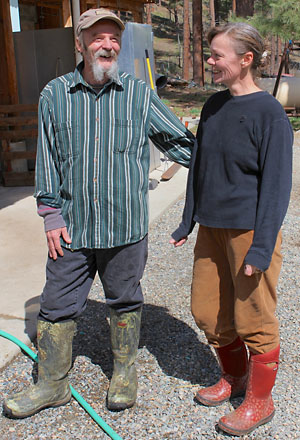 Lonnie and Jamie Trask manage Sunny Pine Farm’s dairy goat and cheese operation up the Twisp River. Lonnie and Jamie Trask manage Sunny Pine Farm’s dairy goat and cheese operation up the Twisp River. In fact, one of the questions his students have to answer for themselves is: “Do you need it [your farm] to be a business or can you do something on a smaller scale and have it be a lifestyle?” He illustrated the point by telling Grist about a former student who was making and selling sheep-milk cheese. She came to realize the business would never pencil out, Beus said, but she enjoyed what she was doing so much that she decided to keep fewer animals and continue to make cheese. Sunny Pine Farm The third farm visit was to Sunny Pine Farm up the Twisp River Valley—a goat dairy operation known for its milk and cheeses that was started by Ed and Vicky Welch. Farm managers Lonnie and Jamie Trask apologized to the students for being somewhat disorganized. But in addition to dealing with their regular milking chores and dozens of pregnant goats delivering kids, they had been up all night averting disaster after a pump failed. Yet another dose of reality for the would-be commercial farmers in the bunch – the ability to solve unexpected problems. (Editor’s note: Sunny Pine Farm was struck by lightning on August 4. Two buildings burned to the ground, but no people or farm animals were hurt.) It’s not easy to develop a small farm plan, Beus told Grist recently. “It’s really hard to do the math and put a value on your time… It’s a lifestyle, and how do you put a number on that?” 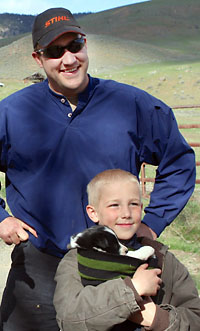 Hayden Johnson, 8, holds the new border collie puppy he received from Jessie Lopez at the Golden Doe Ranch. His dad, Travis Johnson, standing behind Hayden, said the pup was named Rider, and the family returned to the ranch to get a second dog. Hayden Johnson, 8, holds the new border collie puppy he received from Jessie Lopez at the Golden Doe Ranch. His dad, Travis Johnson, standing behind Hayden, said the pup was named Rider, and the family returned to the ranch to get a second dog. He also said he doesn’t “sugarcoat” what it takes to be successful and tells his students it “depends on marketing skills and production skills.” Because Okanogan County is so large, Beus moves the class, which this year cost $110 per farm. Next year it will be in the Omak-Okanogan area, he said. Methow Valley residents willing to drive over Loup Loup Pass weekly starting in mid-February are welcome to enroll. The county extension office also offers numerous workshops on agriculture and country living. The schedule is posted on their website. For more information call the office at 509-422-7245.
NEXT (in part two): Meet Robert and Christie Nolin, city people who retired to the valley to become farmers on a piece of ground near Carlton.
8/5/2013
Comments
|